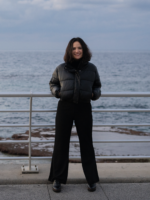Poem of the Week | August 19, 2019
![Diane Seuss “[Takes time to get to minimalism, years lived through, eau de]”](https://missourireview.com/wp-content/uploads/2019/08/Color-1.jpg)
Diane Seuss “[Takes time to get to minimalism, years lived through, eau de]”
This week’s Poem of the Week is “[Takes time to get to minimalism, years lived through, eau de]” by Diane Seuss. Seuss’s set of poems won Missouri Review‘s 2018 Editors’ Prize in Poetry.
Diane Seuss’s most recent collection, Still Life with Two Dead Peacocks and a Girl, was released in 2018 by Graywolf Press and was a finalist for the National Book Critics Circle Award in Poetry and the Los Angeles Times Book Prize in Poetry; Four-Legged Girl, published in 2015 by Graywolf Press, was a finalist for the Pulitzer Prize. Wolf Lake, White Gown Blown Open won the Juniper Prize and was published by the University of Massachusetts Press in 2010. A fifth collection, Frank: Sonnets, is forthcoming from Graywolf Press in 2021. Seuss was raised in rural Michigan, which she continues to call home.
To enter our 29th Annual Editors’ Prize contest, mosey on over here.
[Takes time to get to minimalism, years lived through, eau de]
Takes time to get to minimalism, years lived through, eau de
suffering, yes, I’m in that camp, as Orr writes, we move from
choked silence to blurted speech to diary with its useless key
to story to poetry, the most shaped, therefore most distant from
the original crime, even pleasure can be a crime, especially
once it’s lost, and happiness, the word an assault on the tongue,
why, the patient asks the doctor, does everything taste bitter
as the stems of dandelions, even the tongue tasting itself tastes
bitter. When I was a child, one night, all I could smell was blood,
I told no one, it went on like that for months until a torrential rain
laundered the air, Con at 88, his lungs full of cancer, mind hijacked
by dementia, can’t remember his own poems nor holding a pen,
though he accepts my reading them to him, that’s a good one, he
says, coughs, an urn-shaped moment, thus radiant, therefore true.
Author’s Note
I love Gregory Orr’s book Poetry as Survival and his notion that poetry, a made thing, an aesthetic object, a Grecian urn, has the capacity to move trauma from the roiling interior to a more objective exterior space. That awareness lives at the heart of this unrhymed sonnet, part of a collection of sonnets that together constitute a kind of memoir. I suppose the thesis of this poem, or its central question, is similar to that of all of my poems: How does one live past loss, beyond suffering? That question collides in the poem with the dying and death of my mentor, poet Conrad Hilberry. In our time together at the end of his life he knew the phases of the moon, he knew which direction the window faced in his assisted living facility, but he didn’t remember his own poems, not a word. When I told him I was working on sonnets, he warned me against straying too far from the traditional form, which he precisely remembered, but he experienced his own poems as if written by a stranger. There is mystery in that for me: What does a body of work mean, a lifetime of devotion to lyric poetry, if, in the end, it flies beyond the grasp of its maker? Maybe it’s the ultimate expression of Orr’s precept, that our poems sail on without us. Still, the poem ends by valuing a particular moment in which we sat together, occupying a precipice, a Grecian urn of a moment, beautiful, and “therefore true.”
SEE THE ISSUE
SUGGESTED CONTENT

Poem of the Week
Apr 22 2024
“Faith” by Nur Turkmani
“Faith” by Nur Turkmani is our Poem of the Week. Nur Turkmani lives in Beirut and researches social movements, gender, displacement, and agriculture. Her writing appears in West Branch, The… read more

Poem of the Week
Apr 15 2024
“Love Poem for Lois” by Regan Green
“Love Poem for Lois” by Regan Green is our Poem of the Week. Regan Green grew up in Columbia, Tennessee, and now lives in Baltimore. She is a junior lecturer… read more

Poem of the Week
Apr 08 2024
“Gray” by Melissa Ginsburg
“Gray” by Melissa Ginsburg is our Poem of the Week. Melissa Ginsburg is the author of the poetry collections Doll Apollo (winner of the Mississippi Institute of Arts and Letters… read more

